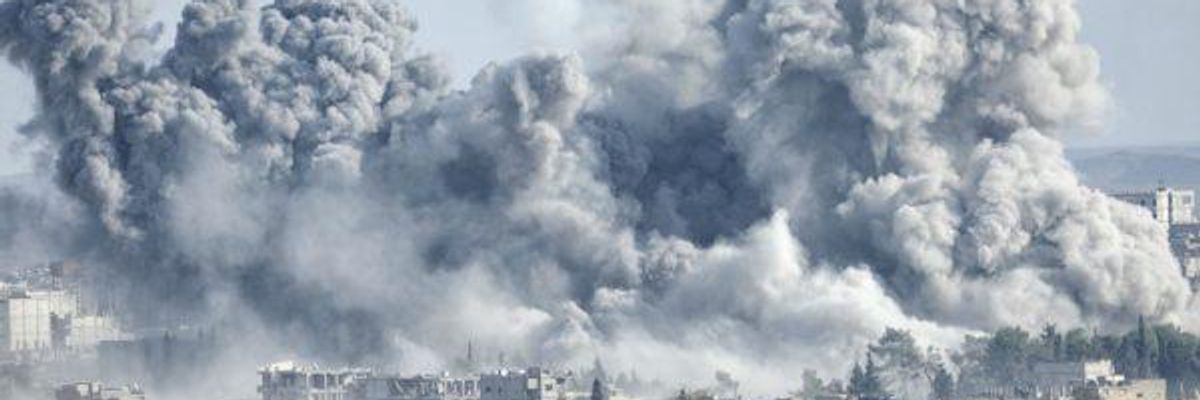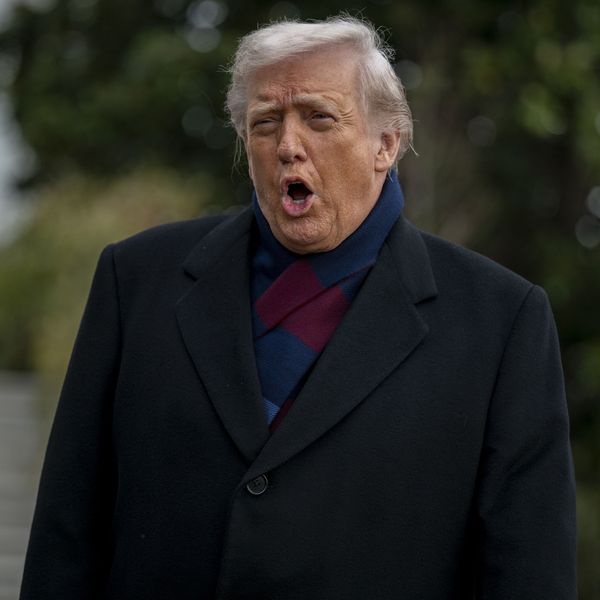
U.S. bombs explode over Syria, 2014 (Shutterstock)
There Was Nothing Humanitarian About Our Strikes on Syria
We fired 105 missiles on April 14. That’s 10 times the number of Syrian refugees we’ve taken all year.
Just after midnight on April 14, the U.S. and its allies bombed three Syrian regime targets. The reason, they said, was to punish Syria's alleged use of chemical weapons in the town of Douma.
Now, the Syrian regime's brutality has been well documented. Maybe the allegations are true. But there's a lot about this that's simply fishy.
Only days before the strikes, U.S. Secretary of Defense Jim Mattis admitted that the U.S. was "still assessing" whether chemical weapons were used. Veteran journalist Robert Fisk has since spoken to local doctors there who cast doubt on the claims.
There's been no independent international investigation. In fact, the U.S. started bombing the day before international investigators were slated to arrive in Douma.
President Trump, of all people, insists there was a humanitarian imperative to skip the fact-finding. "This is about humanity," he said. But if we look at his response to other regional catastrophes, that doesn't even begin to add up.
For one thing, NPR reports, Trump's all-out war on refugees, especially Muslim ones, has meant that just 11 -- eleven -- Syrian refugees have been admitted to the U.S. this year. We fired about 10 times that many missiles the night of the 14th alone.
Ten missiles for every refugee doesn't strike me as terribly humanitarian. Especially when, as AirWars.org reports, U.S. coalition strikes have killed a minimum of 6,200 civilians between Syria and Iraq.
And just look at what U.S. allies are doing.
Around the same time as the fighting in Douma, Israeli soldiers were firing on nonviolent Palestinian protesters in Gaza. They killed at least 17 and injured over 1,000 in what Human Rights Watch calls a "calculated" assault on civilians.
Meanwhile, Saudi Arabia was dropping more bombs on Yemen. The Saudi-led war and blockade there have killed perhaps tens of thousands and put millions more at risk of starvation and disease. The UN calls Yemen the worst humanitarian crisis in the world.
Far from running to the ramparts, the U.S. has abetted these crimes at every stage. After the Gaza killings, the Trump administration vetoed a UN resolution affirming Palestinians' "right to peaceful protest" and urging an investigation.
In Yemen, the U.S. is actually refueling the Saudi planes dropping the bombs. And American moguls, celebrities, and politicians -- including Trump -- lined up to celebrate the war's architect, Saudi crown prince Muhammad bin Salman, throughout his tour of the U.S. this month.
Our strikes on Syria, which ran completely afoul of both U.S. and international law, aren't about helping people. They won't end the war, and they may not even stop future chemical attacks.
It's more like Trump's putting on a big show. Like he had to do it just because he tweeted he would. "These strikes are like when a fistfight breaks out on the reality show Big Brother," writes regional expert Juan Cole.
Unlike Big Brother or Celebrity Apprentice, innocent people will die as a result. In addition to killing more Syrians, escalating now could put the U.S. into direct conflict with Russia -- Syria's nuclear-armed ally. All for an ineffectual response to an unconfirmed attack.
No wonder some senators are finally discussing reining in the president's war-making authority. I hope they cut it down to nothing.
An Urgent Message From Our Co-Founder
Dear Common Dreams reader, The U.S. is on a fast track to authoritarianism like nothing I've ever seen. Meanwhile, corporate news outlets are utterly capitulating to Trump, twisting their coverage to avoid drawing his ire while lining up to stuff cash in his pockets. That's why I believe that Common Dreams is doing the best and most consequential reporting that we've ever done. Our small but mighty team is a progressive reporting powerhouse, covering the news every day that the corporate media never will. Our mission has always been simple: To inform. To inspire. And to ignite change for the common good. Now here's the key piece that I want all our readers to understand: None of this would be possible without your financial support. That's not just some fundraising cliche. It's the absolute and literal truth. We don't accept corporate advertising and never will. We don't have a paywall because we don't think people should be blocked from critical news based on their ability to pay. Everything we do is funded by the donations of readers like you. Will you donate now to help power the nonprofit, independent reporting of Common Dreams? Thank you for being a vital member of our community. Together, we can keep independent journalism alive when it’s needed most. - Craig Brown, Co-founder |
Just after midnight on April 14, the U.S. and its allies bombed three Syrian regime targets. The reason, they said, was to punish Syria's alleged use of chemical weapons in the town of Douma.
Now, the Syrian regime's brutality has been well documented. Maybe the allegations are true. But there's a lot about this that's simply fishy.
Only days before the strikes, U.S. Secretary of Defense Jim Mattis admitted that the U.S. was "still assessing" whether chemical weapons were used. Veteran journalist Robert Fisk has since spoken to local doctors there who cast doubt on the claims.
There's been no independent international investigation. In fact, the U.S. started bombing the day before international investigators were slated to arrive in Douma.
President Trump, of all people, insists there was a humanitarian imperative to skip the fact-finding. "This is about humanity," he said. But if we look at his response to other regional catastrophes, that doesn't even begin to add up.
For one thing, NPR reports, Trump's all-out war on refugees, especially Muslim ones, has meant that just 11 -- eleven -- Syrian refugees have been admitted to the U.S. this year. We fired about 10 times that many missiles the night of the 14th alone.
Ten missiles for every refugee doesn't strike me as terribly humanitarian. Especially when, as AirWars.org reports, U.S. coalition strikes have killed a minimum of 6,200 civilians between Syria and Iraq.
And just look at what U.S. allies are doing.
Around the same time as the fighting in Douma, Israeli soldiers were firing on nonviolent Palestinian protesters in Gaza. They killed at least 17 and injured over 1,000 in what Human Rights Watch calls a "calculated" assault on civilians.
Meanwhile, Saudi Arabia was dropping more bombs on Yemen. The Saudi-led war and blockade there have killed perhaps tens of thousands and put millions more at risk of starvation and disease. The UN calls Yemen the worst humanitarian crisis in the world.
Far from running to the ramparts, the U.S. has abetted these crimes at every stage. After the Gaza killings, the Trump administration vetoed a UN resolution affirming Palestinians' "right to peaceful protest" and urging an investigation.
In Yemen, the U.S. is actually refueling the Saudi planes dropping the bombs. And American moguls, celebrities, and politicians -- including Trump -- lined up to celebrate the war's architect, Saudi crown prince Muhammad bin Salman, throughout his tour of the U.S. this month.
Our strikes on Syria, which ran completely afoul of both U.S. and international law, aren't about helping people. They won't end the war, and they may not even stop future chemical attacks.
It's more like Trump's putting on a big show. Like he had to do it just because he tweeted he would. "These strikes are like when a fistfight breaks out on the reality show Big Brother," writes regional expert Juan Cole.
Unlike Big Brother or Celebrity Apprentice, innocent people will die as a result. In addition to killing more Syrians, escalating now could put the U.S. into direct conflict with Russia -- Syria's nuclear-armed ally. All for an ineffectual response to an unconfirmed attack.
No wonder some senators are finally discussing reining in the president's war-making authority. I hope they cut it down to nothing.
Just after midnight on April 14, the U.S. and its allies bombed three Syrian regime targets. The reason, they said, was to punish Syria's alleged use of chemical weapons in the town of Douma.
Now, the Syrian regime's brutality has been well documented. Maybe the allegations are true. But there's a lot about this that's simply fishy.
Only days before the strikes, U.S. Secretary of Defense Jim Mattis admitted that the U.S. was "still assessing" whether chemical weapons were used. Veteran journalist Robert Fisk has since spoken to local doctors there who cast doubt on the claims.
There's been no independent international investigation. In fact, the U.S. started bombing the day before international investigators were slated to arrive in Douma.
President Trump, of all people, insists there was a humanitarian imperative to skip the fact-finding. "This is about humanity," he said. But if we look at his response to other regional catastrophes, that doesn't even begin to add up.
For one thing, NPR reports, Trump's all-out war on refugees, especially Muslim ones, has meant that just 11 -- eleven -- Syrian refugees have been admitted to the U.S. this year. We fired about 10 times that many missiles the night of the 14th alone.
Ten missiles for every refugee doesn't strike me as terribly humanitarian. Especially when, as AirWars.org reports, U.S. coalition strikes have killed a minimum of 6,200 civilians between Syria and Iraq.
And just look at what U.S. allies are doing.
Around the same time as the fighting in Douma, Israeli soldiers were firing on nonviolent Palestinian protesters in Gaza. They killed at least 17 and injured over 1,000 in what Human Rights Watch calls a "calculated" assault on civilians.
Meanwhile, Saudi Arabia was dropping more bombs on Yemen. The Saudi-led war and blockade there have killed perhaps tens of thousands and put millions more at risk of starvation and disease. The UN calls Yemen the worst humanitarian crisis in the world.
Far from running to the ramparts, the U.S. has abetted these crimes at every stage. After the Gaza killings, the Trump administration vetoed a UN resolution affirming Palestinians' "right to peaceful protest" and urging an investigation.
In Yemen, the U.S. is actually refueling the Saudi planes dropping the bombs. And American moguls, celebrities, and politicians -- including Trump -- lined up to celebrate the war's architect, Saudi crown prince Muhammad bin Salman, throughout his tour of the U.S. this month.
Our strikes on Syria, which ran completely afoul of both U.S. and international law, aren't about helping people. They won't end the war, and they may not even stop future chemical attacks.
It's more like Trump's putting on a big show. Like he had to do it just because he tweeted he would. "These strikes are like when a fistfight breaks out on the reality show Big Brother," writes regional expert Juan Cole.
Unlike Big Brother or Celebrity Apprentice, innocent people will die as a result. In addition to killing more Syrians, escalating now could put the U.S. into direct conflict with Russia -- Syria's nuclear-armed ally. All for an ineffectual response to an unconfirmed attack.
No wonder some senators are finally discussing reining in the president's war-making authority. I hope they cut it down to nothing.

